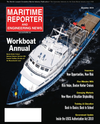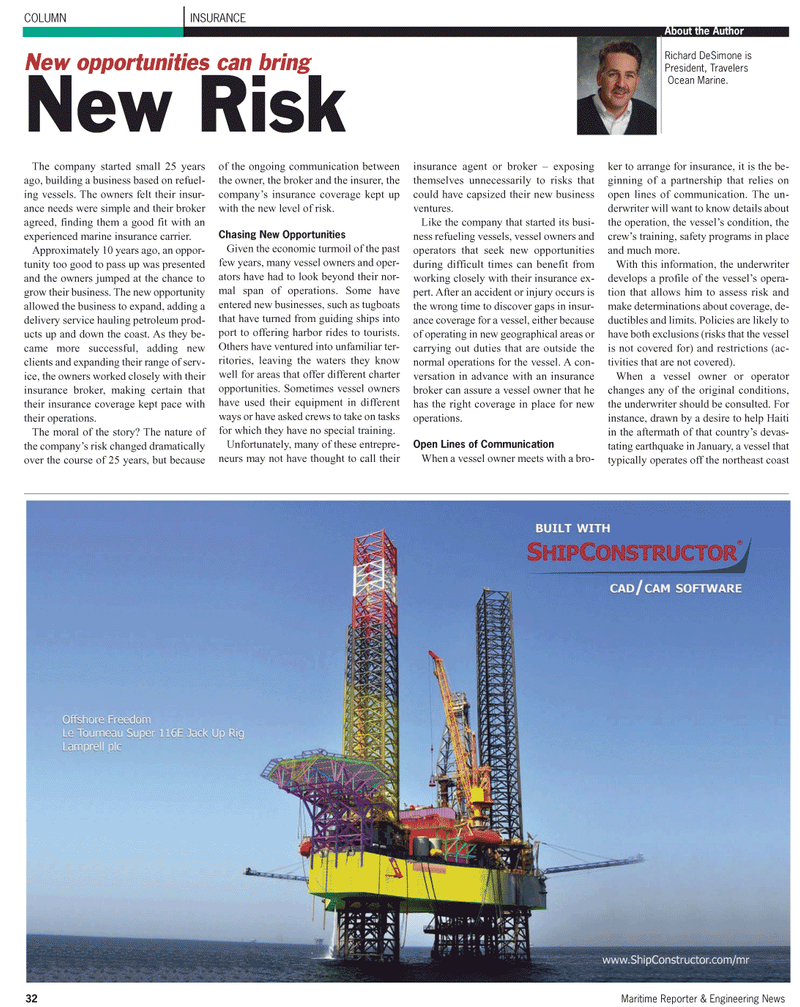
Page 32: of Maritime Reporter Magazine (November 2010)
Workboat Annual
Read this page in Pdf, Flash or Html5 edition of November 2010 Maritime Reporter Magazine
32 Maritime Reporter & Engineering News
New opportunities can bring
New Risk
The company started small 25 years ago, building a business based on refuel- ing vessels. The owners felt their insur- ance needs were simple and their broker agreed, finding them a good fit with an experienced marine insurance carrier.
Approximately 10 years ago, an oppor- tunity too good to pass up was presented and the owners jumped at the chance to grow their business. The new opportunity allowed the business to expand, adding a delivery service hauling petroleum prod- ucts up and down the coast. As they be- came more successful, adding new clients and expanding their range of serv- ice, the owners worked closely with their insurance broker, making certain that their insurance coverage kept pace with their operations.
The moral of the story? The nature of the company’s risk changed dramatically over the course of 25 years, but because of the ongoing communication between the owner, the broker and the insurer, the company’s insurance coverage kept up with the new level of risk.
Chasing New Opportunities
Given the economic turmoil of the past few years, many vessel owners and oper- ators have had to look beyond their nor- mal span of operations. Some have entered new businesses, such as tugboats that have turned from guiding ships into port to offering harbor rides to tourists.
Others have ventured into unfamiliar ter- ritories, leaving the waters they know well for areas that offer different charter opportunities. Sometimes vessel owners have used their equipment in different ways or have asked crews to take on tasks for which they have no special training.
Unfortunately, many of these entrepre- neurs may not have thought to call their insurance agent or broker – exposing themselves unnecessarily to risks that could have capsized their new business ventures.
Like the company that started its busi- ness refueling vessels, vessel owners and operators that seek new opportunities during difficult times can benefit from working closely with their insurance ex- pert. After an accident or injury occurs is the wrong time to discover gaps in insur- ance coverage for a vessel, either because of operating in new geographical areas or carrying out duties that are outside the normal operations for the vessel. A con- versation in advance with an insurance broker can assure a vessel owner that he has the right coverage in place for new operations.
Open Lines of Communication
When a vessel owner meets with a bro- ker to arrange for insurance, it is the be- ginning of a partnership that relies on open lines of communication. The un- derwriter will want to know details about the operation, the vessel’s condition, the crew’s training, safety programs in place and much more.
With this information, the underwriter develops a profile of the vessel’s opera- tion that allows him to assess risk and make determinations about coverage, de- ductibles and limits. Policies are likely to have both exclusions (risks that the vessel is not covered for) and restrictions (ac- tivities that are not covered).
When a vessel owner or operator changes any of the original conditions, the underwriter should be consulted. For instance, drawn by a desire to help Haiti in the aftermath of that country’s devas- tating earthquake in January, a vessel that typically operates off the northeast coast
COLUMN INSURANCE
About the Author
Richard DeSimone is
President, Travelers
Ocean Marine.

 31
31

 33
33
